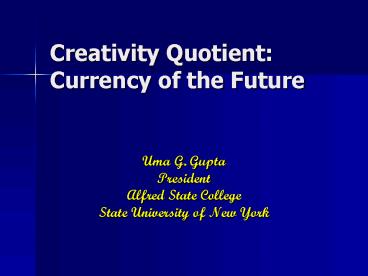Creativity Quotient: Currency of the Future - PowerPoint PPT Presentation
1 / 14
Title:
Creativity Quotient: Currency of the Future
Description:
Inability to keep pace with demands! Always playing catch-up! No end in sight! Desire for more balance in life! ... We are all darned specialists (aren't you? ... – PowerPoint PPT presentation
Number of Views:69
Avg rating:3.0/5.0
Title: Creativity Quotient: Currency of the Future
1
Creativity QuotientCurrency of the Future
- Uma G. Gupta
- President
- Alfred State College
- State University of New York
2
Individual Workplace Challenges
- Too busy at work!
- Lack of time!
- Information Overload!
- Stressed!
- Inability to keep pace with demands!
- Always playing catch-up!
- No end in sight!
- Desire for more balance in life!
- Technology pain.
- Email addiction.
- Benign neglect of friends and family.
- The more you do, the more you have to do!
3
Creativity
- Old models and old solutions to new problems
wont work! Dont work! - Continue to reinvest in ourselves, our thinking,
learning, and re-learning, and unlearning. - At the heart of this approach, lies creativity
and our commitment to creativity.
4
Changing Face of Education
- Two inherent challenges to human thinking
- We think locally (human nature)
- We are all darned specialists (arent you?)
- Education is no longer the privilege of elite
nations. - Significant Implications
- A common world language - English
- Well-informed by historic standards
- Access to knowledge
- Instant, global communications
- Concerned locally Driven by global events
- What does all of this mean for problem-solvers
and decision-makers?
5
Currency for Progress
- Education
- Training
- Technology
- Systems
- Capitalize Human Potential
- Expand Monetary Resources
- Health Care
- Transportation
- Narrow the Divide
- Attack hunger and poverty
- Control Terrorism
- CREATIVITY
6
Creativity
- Creativity is inventing, experimenting, growing,
taking risks, breaking rules, making mistakes,
and having fun." Mary Lou Cook - "There are two ways of being creative. One can
sing and dance. Or one can create an environment
in which singers and dancers flourish."Warren G.
Bennis - All knowledge is already present, and the most we
can do is create conditions in which intuition
will occur. It's like rain pouring down from the
heavens--to have more of it, we need only to
remove our umbrellas - Jagdish Parikh.
7
Creativity Quotient
- Creativity is the real currency of progress.
- There is nothing you can build, invent, or
license that cannot be reproduced. - Focus not just on how we work together, but how
we think together.
8
Fundamental Questions
- What is creativity? (Producing, not reproducing)
- Where in your organization is creativity most
needed? - Why?
- What attributes would you look for in a creative
person? - What spurs creativity (not what you think!)
9
The Curse of Knowledge
- The well-trodden path kills creativity.
- Peter Watsons exercise (2,4,6).
- Most people dont search for alternatives and
dont ask questions even when there is no
penalty. - Einstein and the needle in the haystack.
- Looking for alternatives even when the solution
is found. - Producing, not reproducing solutions.
10
What if?
- What if every customer was greeted at the door?
- What if everyone donated a dollar to cancer?
- What if I can shop on-line?
- What if I can heat my car from my house?
- What if I can .what?
- Scott Ginsberg is a professional speaker, "The
World's Foremost Expert on Nametags"
11
Obstacles to Creativity
- Bureaucrats
- Leaders (or, our ideas about leadership)
- Purpose, power, and wealth.
- Control, consistency, and predictability.
- Patriarchy the belief those at the top are
responsible for the success of the organization. - Partnership distributes power to where the
action is. Accountability is derived from
stewardship, not control.
12
Answer this!
- Here's a riddle. What is the only business book
ever to spend more than 19 weeks on the New York
Times best-seller list, sell more than a million
copies, and be nominated for the prestigious
National Book Award? - Fast Company
13
Take away
- What is your take away?
- What is the one problem to which you look to
produce a solution, rather than to reproduce a
solution? - Good Night!
14
So, what is your business?
- If you answered, teach engineering, you are
still in the 70s. - If you answered, teach engineering and career
skills, you are in the 80s. - If you answered, teach engineering, business,
e-commerce, and career skills, you are in the
90s. - If you answered, teach them not to invest in a
dot com company, you are in 2002. - If you answered, teach them to teach themselves
you are in 2004. - If you answered, I am continuously learning and
relearning what I need to teach you are
qualified to teach the student of tomorrow!































